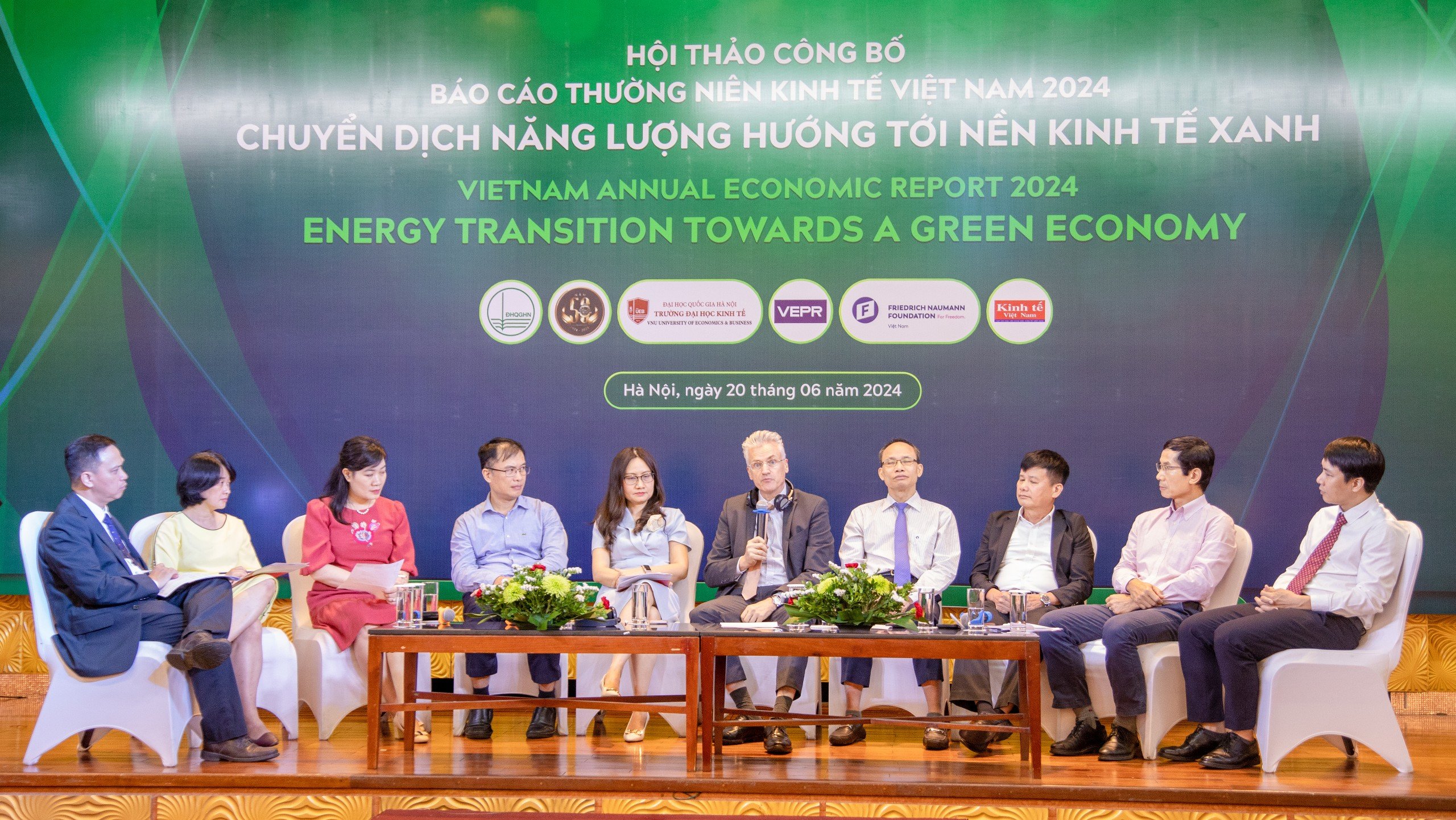
Delegates exchanged and shared in the discussion section.
Along with that, the Workshop also had the participation of Leaders of Ministries and Departments; representatives of some Embassies of Australia, Russia, Italy...; policy makers, universities, research institutes, scientists , international organizations and press agencies. The Vietnam Annual Economic Report is a product of the Vietnam Institute for Economic and Policy Research (VEPR), under the University of Economics, VNU, which has been continuously published and announced over the past 16 years, focusing on independent and objective analysis of achievements, difficulties, opportunities and challenges in the development process, contributing to providing a scientific basis for macroeconomic policy making, while selectively discussing a number of major and in-depth economic issues of Vietnam. This year's Vietnam Annual Economic Report 2024 was prepared by Dr. Nguyen Quoc Viet - Deputy Director of the Institute for Economic and Policy Research is the editor-in-chief, bringing together a large number of scientists, economic research experts, lecturers from research institutes and universities to participate. The report has received advice and criticism from many senior experts in the field of economics. The report will be a useful reference for managers, policy makers, researchers as well as for all those interested in macroeconomic issues and development policies in Vietnam in recent years. Energy transition towards a green economy is an urgent matter in Vietnam. Speaking at the opening of the workshop, Vice President of VNU Pham Bao Son said: The Vietnam Annual Economic Report 2024 with the theme "energy transition towards a green economy", this is a practical requirement and a trend of the times, of global stature, is increasingly becoming a top priority of Vietnam on the journey of integration, towards sustainable and comprehensive development. As one of the most ambitious Asian countries at COP26, Vietnam’s net zero emissions strategy commits to reducing emissions by 43.5% by 2030. However, increasing pressure from strict environmental regulations from developed countries is urging the Vietnamese Government and businesses to participate more quickly and strongly in the energy transition towards greening the economy. This is both a challenge and an opportunity for countries like Vietnam to accelerate economic restructuring towards sustainability, improve competitiveness and take advantage of new trade and investment cooperation opportunities. The workshop announcing the Vietnam Annual Economic Report 2024 will be a forum for domestic and foreign policymakers, scientists, businesses, and experts to exchange and discuss the global economic panorama in 2023 and the first half of 2024, an overview of some major economies with close relations with Vietnam, the world economic outlook in 2024, and the trend of renewable energy transition globally. The workshop will be a place to gather and summarize experiences and research, and from there, make overall recommendations for policies to promote energy transition, green growth, and sustainability that Vietnam is interested in. The 2024 annual reports all mention the economic situation of Vietnam in the previous year and discuss trends in the following year, especially focusing on a topic related to the development of the Vietnamese economy. VNU hopes that the research results will contribute to the short-term and long-term policy-making process of Government agencies. This is also the goal of the research being conducted at the University of Economics in particular and VNU in general. With strong research groups in many different fields, objective, independent, evidence-based research by scientists from VNU will be a useful basis for the policy-making process of the Party and Government agencies of Vietnam.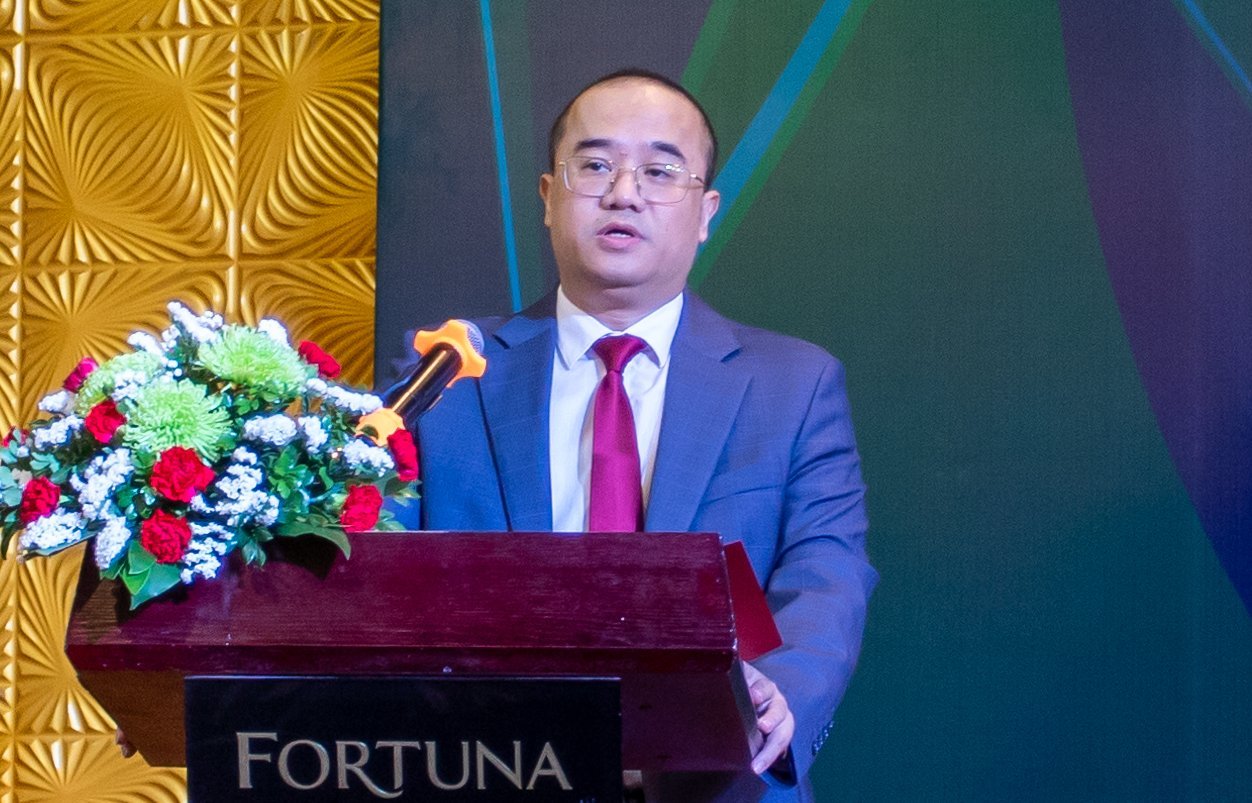
Chairman of the Board of Directors of the University of Economics, Associate Professor, Dr. Nguyen Truc Le spoke at the Workshop
Chairman of the Board of Directors of the University of Economics, Associate Professor, Dr. Nguyen Truc Le added: The workshop will discuss and suggest issues such as current bottlenecks in the energy transition process in Vietnam? What are the most inadequate points that we need to focus on evaluating?; What are the experiences of developed countries, emerging economies, and the ASEAN community in solving those bottlenecks?; To promote the energy transition towards a green economy, what appropriate binding conditions are needed to be able to immediately implement in Vietnam; Consulting and advising us on which solutions can be implemented and applied for each specific stage in the socio-economic context in Vietnam?; What are the new points about solutions that need to be announced and shared with domestic policymakers?; We also hope that the speakers will share more ways to protect the rights and interests of all parties when participating in the sustainable development of the energy transition towards a green economy in Vietnam. Sponsor representative, Prof. Dr. Andreas Stoffers, Country Director of FNF Vietnam, said: The Vietnam Annual Economic Report 2024 marks 16 years of establishment and development. This year’s report, themed “Energy Transition towards a Green Economy”, is fully aligned with the upcoming challenges of Vietnam as the country aims to become an industrialized nation by 2045. While over the past centuries, the rate of severe natural disasters and human casualties globally has decreased, we cannot afford to become complacent. Environmental protection must remain a top priority. Anyone who has lived or visited Vietnam can attest to the urgent need for a green transition. This includes clean energy production, environmentally friendly waste treatment, wastewater treatment, plastic waste reduction and the creation of smarter, more livable cities. In recent years, FNF Vietnam has been particularly active in the field of smart cities, making an important contribution to Vietnam’s green transition. Green growth will be a key factor for the future. For example, salinity intrusion in the Mekong Delta highlights the need to address upstream dams that impede irrigation in the delta. This poses a significant environmental challenge. Furthermore, it is important for Vietnam to diversify and strengthen its partnerships, taking into account geostrategic challenges. Building a diverse range of trading partners, including Germany and the EU, is crucial. Greater participation in global value chains will also help Vietnam access new markets. This diversification, especially in the context of improved risk management, environmental protection and sustainability, is essential for the Vietnamese economy and individual companies. Vietnamese enterprises must adapt to increasing competitive pressure from foreign companies in the fields of green technology, manufacturing and trade. This includes complying with international standards and the growing demands of trading partners and consumers, especially in European markets with high demand for green products. The purpose of our 2024 report is to further promote cooperation between UEB/VNU, VEPR and FNF on the one hand and policy-making experts and the media on the other. We hope to make specific recommendations for the Party, the State, the business community and society. At the workshop, representatives of the University of Economics presented books to the authors of the 2023 Annual Economic Report.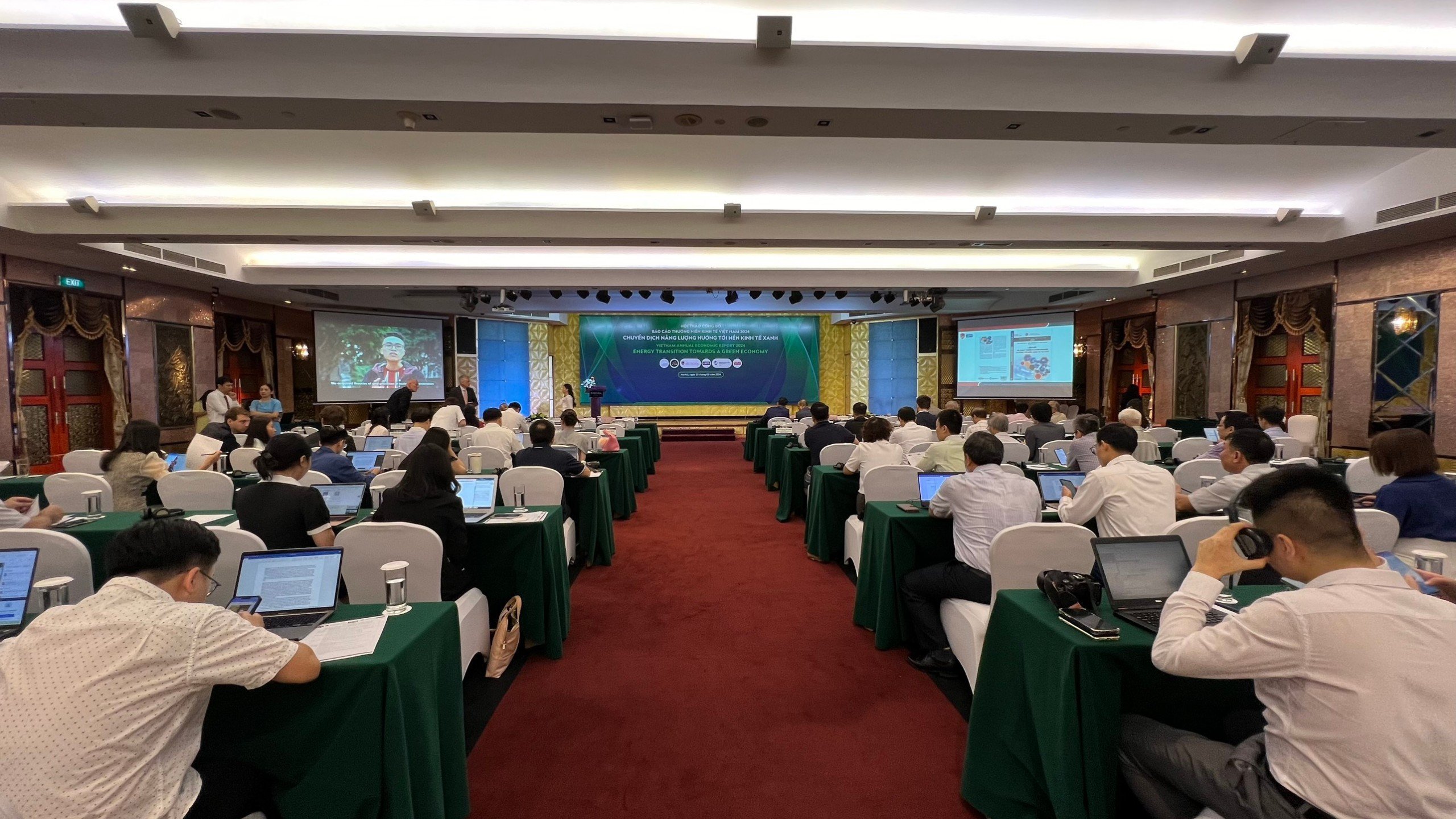
Scene at the Workshop
Many useful solutions towards a green economy and sustainable development in Vietnam This year's annual report focuses on the exchange and discussion of the global economic panorama in 2023 and nearly the first half of 2024, an overview of some major economies with close relations with Vietnam, the world economic outlook in 2024 and the trend of renewable energy transition globally; Overview of Vietnam's economy in 2023 and nearly the first half of 2024: on economic growth, inflation, money, credit, financial, labor and energy markets; Assessment of the relationship between renewable energy transition and economic growth: the impact of renewable energy transition on economic growth such as GDP, employment rate and the development of related industries; Studying international experiences in countries such as the UK, Germany, and China on renewable energy transition and proposing solutions to promote renewable energy transition in Vietnam; Liberalizing the direct electricity market to promote the development of rooftop solar power in Vietnam: applying theory and research on international experiences in building a direct competitive electricity trading market (PDDA) applied to rooftop solar power, raising barriers and difficulties when applying the direct electricity trading mechanism for rooftop power in industrial parks, thereby proposing policies to implement and apply the competitive and direct electricity trading mechanism in industrial parks to meet green export standards. Experts and reviewers participated in discussing the contents of the report, including the reviewers' opinions of economic experts, scholars at home and abroad, managers, and policy makers who participated in the workshop. At the workshop, Vice Rector of the University of Economics, VNU, Assoc. Prof. Dr. Nguyen Anh Thu said; In the 2024 annual report, experts have drawn a number of important conclusions to suggest some important policy recommendations. Associate Professor, Dr. Nguyen Anh Thu shared that in the short term, in order to achieve the economic growth target of 6-6.5% in 2024, Vietnam needs to continue to prioritize financial tools of fiscal policy to promote aggregate demand; increase public investment disbursement to ensure progress and focus, especially on important infrastructure projects. Due to weak domestic consumption momentum, it is necessary to continue to reduce VAT in 2024 and consider expanding the scope of application. There should be more specific programs and policies to stimulate consumption, and it is necessary to directly support consumers in paying for products/services, especially to orient consumption towards green, clean, and environmentally friendly consumption trends, contributing to the implementation of the Net Zero commitment by 2050.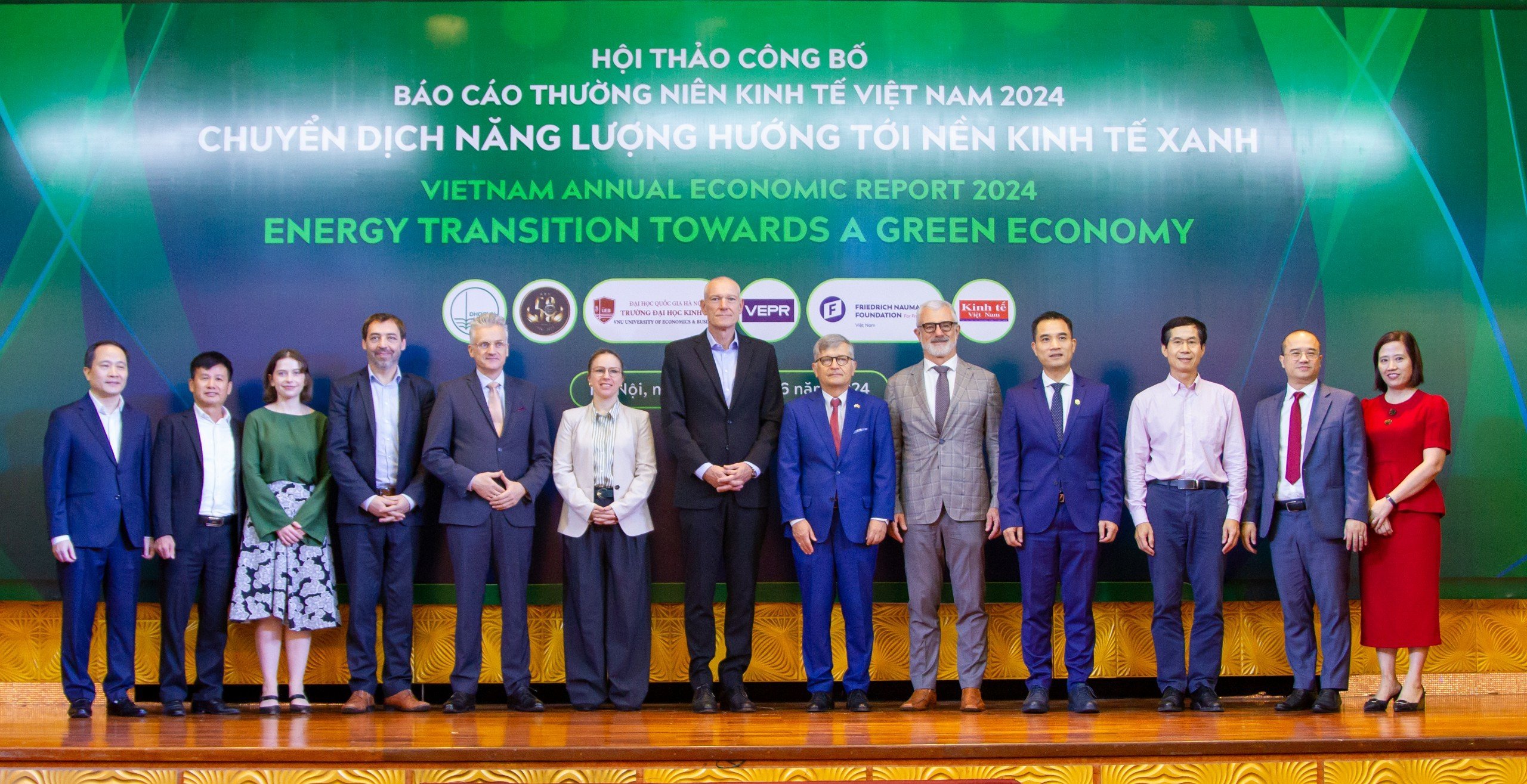
Delegates take souvenir photos together
In addition, there should be more credit packages for businesses to invest in sustainable, carbon-neutral production. The Government should soon announce a green classification list so that qualified businesses can easily access domestic and foreign green credit sources. Provide more capital for credit guarantee funds in localities, increase unsecured loans for small and medium enterprises. Promote credit ratings for small and medium enterprises as a basis for funds to provide credit guarantees. Ensure harmony and efficiency in the target of credit growth to support production and business for businesses in particular, promote consumption and growth recovery in general. Promote diversification of capital and investment channels other than bank credit (improve the efficiency and transparency of the stock market, bonds, other capital channels associated with green credit, equitable energy transition, financial leasing, etc.). Ms. Nguyen Anh Thu also emphasized that medium- and long-term solutions for Vietnam include perfecting the national digital transformation strategy, promoting real value-added factors of the digital economy, such as software technology, platform business, and e-commerce to create a driving force for innovation. It is necessary to promote growth model innovation and economic restructuring. Allocate resources to promote science and technology development and innovation; improve labor productivity in the budget expenditure plan, annual socio-economic development plan (including projects in the Economic Recovery and Development Program) to create a foundation for sustainable economic growth. Research and perfect the social housing development model to overcome current limitations. Establish a state-owned enterprise specializing in social housing development (investment and management of social housing). In addition to the main goal of supporting social security, social housing development also plays an important role in supporting the balance of the real estate market. In addition, social housing development is a long-term, continuous goal and the transfer of the market, especially to the private sector, will find it difficult to ensure social goals due to the commercial nature and difficulties in implementing investment projects and managing social housing in the operational phase. It is necessary to continue to focus on solutions to stimulate investment, especially private investment, to ensure that the total social investment reaches a high level and expand the money supply reasonably to stimulate growth, such as continuing to promote credit growth in priority areas; Focus on removing difficulties in the real estate market, social housing credit packages and issuing corporate bonds; At the same time, continue to strengthen administrative reforms, such as civil transactions, investment procedures, fire prevention and fighting, etc.); improve the business environment. To support businesses, prioritize policies and reforms to remove difficulties, reduce burdens for businesses, build trust in the investment environment to encourage businesses to return to the market and expand their scale. Special support policies for businesses need to be specific and feasible (export support policies are quite successful). In the long term, overall policies aim to improve labor productivity and competitiveness of industries and businesses. University of Economics - Vietnam National University, Hanoi University of Economics is a member unit of Vietnam National University, Hanoi. Throughout its formation and development, the University has continuously improved the quality of training, scientific research and other services with the aim of becoming a research-oriented university, training high-quality human resources in the fields of economics, management and business administration. The University has been affirming its position domestically as well as internationally in the field of research. Internationally, the University of Economics - Vietnam National University, Hanoi is the main, pioneering, leading unit, contributing to the ranking of Vietnam National University, Hanoi in the prestigious world rankings:
|
PV





![[Photo] President Luong Cuong and United Nations Secretary-General Antonio Guterres chaired the signing ceremony of the Hanoi Convention.](https://vphoto.vietnam.vn/thumb/1200x675/vietnam/resource/IMAGE/2025/10/25/1761370409249_ndo_br_1-1794-jpg.webp)


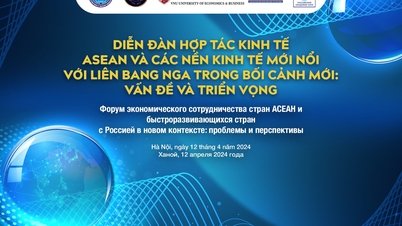
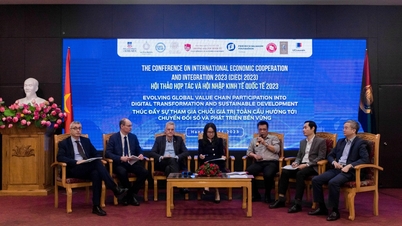
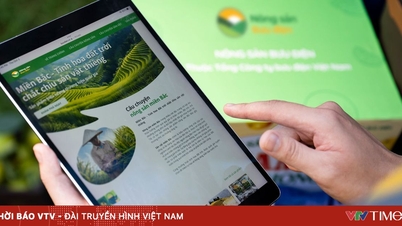



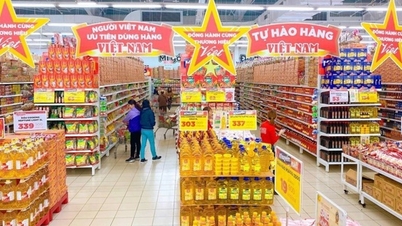


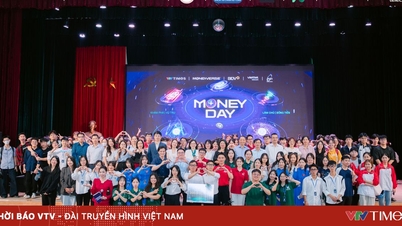






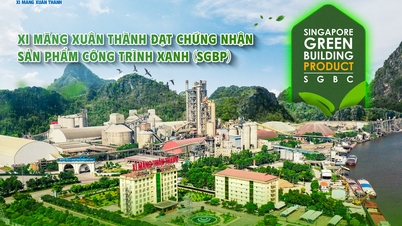

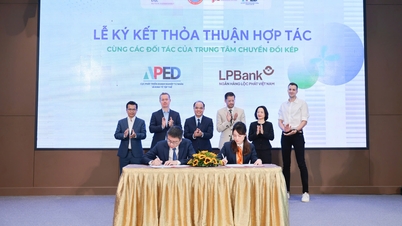









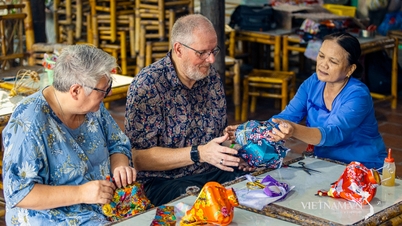



























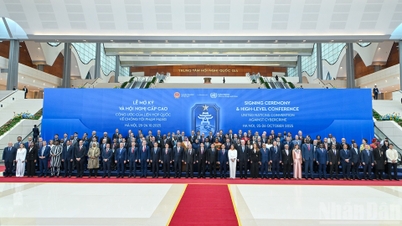





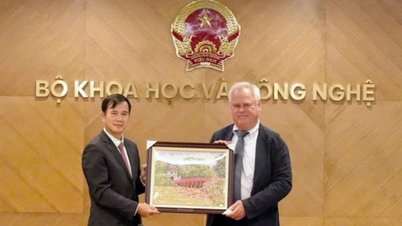

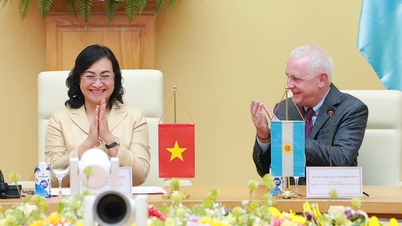


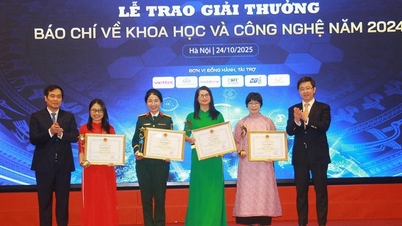
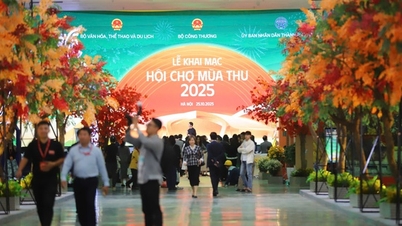
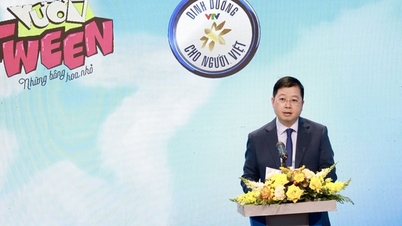


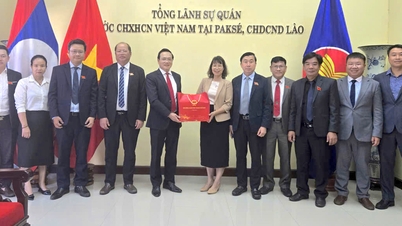

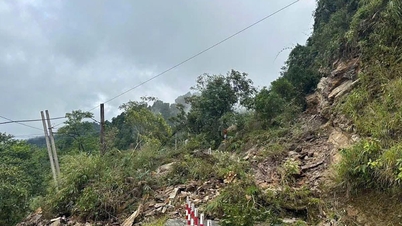

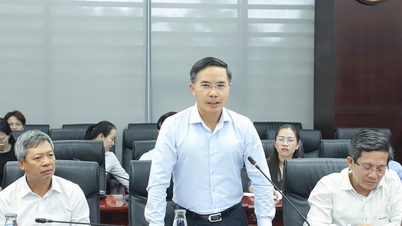

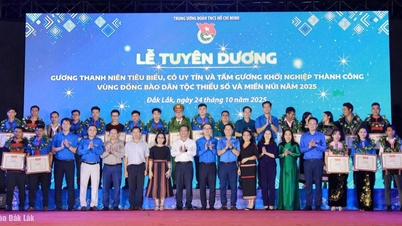
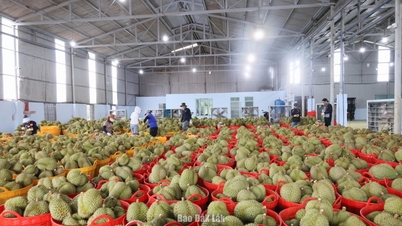

















Comment (0)